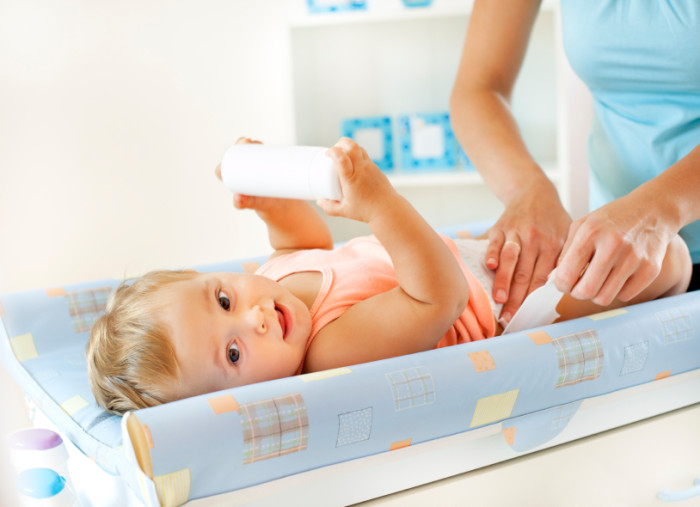Top Class Actions’s website and social media posts use affiliate links. If you make a purchase using such links, we may receive a commission, but it will not result in any additional charges to you. Please review our Affiliate Link Disclosure for more information.

With babies, it doesn’t harm the skin, but the talc (a mineral contained in baby powder that’s composed of hydrated magnesium silicate) can be dangerous if inhaled. The baby powder danger, as pointed out by physicians around the country and renowned holistic doctor Dr. Weil, is that “babies can easily inhale tiny particles of it that are light enough to be carried in the air. When inhaled, talc can dry an infant’s mucous membranes, adversely affect the baby’s breathing, and cause serious lung damage.”
If used, it’s suggested that a parent put the baby powder on their hands first, and then pat down the baby’s bottom.
Since there’s concern about baby powder danger with babies, what about with adults? Baby powder danger exists in the same realm for asthma suffers, as inhalation can cause problems and irritation. But for women there are additional risks – like the recent link between talcum powder and ovarian cancer.
The talc found in Johnson & Johnson baby powder is the same used in a number of women’s hygiene products. According to various studies, the talc was found in a variety of ovarian tumors. Now, women who have used baby powder or Shower-to-Shower on their own genital areas are filing class action lawsuits and Johnson’s baby powder cancer lawsuits against pharmaceutical giant Johnson & Johnson, alleging that the talcum powder found in their products is linked to developing ovarian cancer.
The Baby Powder Danger Research
The American Cancer Society says that many studies of women have looked at the possible link between talcum powder and cancer of the ovaries. The research that brought attention to baby powder danger was published in Cancer Prevention Research journal.
Performed by doctors at Brigham and Women’s Hospital in Boston, the researchers used meta-analysis, looking at data from “8,525 women diagnosed with ovarian cancer and compared talcum powder use with that of 9,800 women who remained cancer-free.” The results showed that regular application of baby powder to the genital area raised the risks of developing ovarian tumors by 24 percent.
The problem is that results have been mixed, and that many case-controlled studies that show positive results can be biased, relying on memories of talc usage. Other studies without this potential bias, like the Brigham and Women’s Hospital study, have not all found an increased risk in ovarian cancer with talcum powder use. However, in either case, research suggests baby powder danger exists when the talcum powder is used near the genitals as a hygiene product. The risk is that it can travel from the vagina to the uterus, fallopian tubes and ovaries.
In 2007, the International Agency for Research on Cancer, a part of the World Health Organization, classified the use of talc-based powders on the genital region as “possibly carcinogenic to humans.” While the risk of ovarian cancer is small, and results come from years of baby power usage, the American Cancer Society still suggests that women may want to avoid or limit the use of products containing talc.
In October 2013, the first ever talcum powder ovarian cancer trial was held. The plaintiff, a South Dakota woman, sued Johnson & Johnson after developing premenopausal ovarian cancer after 30 years of using Shower-to-Shower body powder. Her complaint, and the complaint of many plaintiffs, is that Johnson & Johnson, and other companies using talc in their baby powder products, failed to warn consumers about the dangers of talc and ovarian cancer. Moreover, the question stands as to why the companies did not conduct further testing when the first research came to light.
Do YOU have a legal claim? Fill out the form on this page now for a free, immediate, and confidential case evaluation. The attorneys who work with Top Class Actions will contact you if you qualify to let you know if an individual lawsuit or class action lawsuit is best for you. [In general, baby powder cancer lawsuits are filed individually by each plaintiff and are not class actions.] Hurry — statutes of limitations may apply.
ATTORNEY ADVERTISING
Top Class Actions is a Proud Member of the American Bar Association
LEGAL INFORMATION IS NOT LEGAL ADVICE
Top Class Actions Legal Statement
©2008 – 2024 Top Class Actions® LLC
Various Trademarks held by their respective owners
This website is not intended for viewing or usage by European Union citizens.
Get Help – It’s Free
Join a Free Baby Powder Cancer Class Action Lawsuit Investigation
If you used Johnson’s Baby Powder, Shower to Shower, or another talcum powder product and were diagnosed with ovarian cancer, you may have a legal claim. Family members of loved ones who died of ovarian cancer can also join. Submit your information now for a free case evaluation.
An attorney will contact you if you qualify to discuss the details of your potential case at no charge to you.












